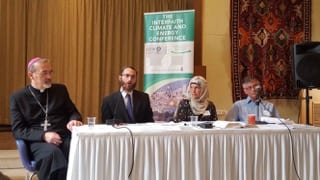
Professor Pinchas Alpert from Tel Aviv University, a leading climate scientist in Israel, explained the scientific perspective on climate change and its impact in the Middle East. Jerusalem has a unique ratio of rainfall and sunshine—as much rain as London, but far more sun. Yet rainfall rates are falling while the frequency of dust storms and freak weather events is rising. Research shows that the Middle East’s Fertile Crescent may even dry up by 2100. Dr. Alon Tal, Chair of the Department of Public Policy at Tel Aviv University, presented climate change as a struggle with our values. If all people in the world consumed as much as the average Israeli, we would need two planets to provide enough resources. Moving forward, we need to make sacrifices, yet faith can give meaning to those sacrifices.
In addition to making changes in our day-to-day lives, we can have an impact through collective action and innovation. Dr. Tareq Abu Hamed, Arava Institute Academic Director and Director of the Center for Renewable Energy and Energy Conservation, gave everyone at the conference a reason to hope: 70% of energy in the Eilat and the southern Arava region of Israel is produced from solar energy, and this may reach 100% by 2020. The Arava Institute also is conducting research on innovative solar energy projects, and is helping facilitate transboundary environmental projects with partners in the region.
We also can look to our religious teachings for guidance. Archbishop Pizzaballa, Titular Archbishop of Verbe, explained that in the Bible, man is dominant, though man should live in harmony with G-d’s creation. Renewable energy addresses both teachings: it provides the energy needed by humans while it is harmonious with nature. Jewish sages taught that it is preferable for water to come from heaven rather than the Earth, so one person cannot dominate the resource and we can all turn our eyes to heaven. Rabbi Sinclair discussed how we can apply this idea to our energy. Renewable energy, which is environmentally sustainable, comes from heaven (the sun and wind), while fossil fuels come from the Earth.
We can also look at religious teachings more broadly. According to Yasmin Barhum, a facilitator at Living in the Levant, in Islam humans are the only part of creation with a choice in our decisions and our lifestyles. We are on Earth because of G-d’s generosity, and life is a test. We should concentrate on being happy with what we have; materialism should not become a form of worship.
Regardless of our religious beliefs, we have a shared responsibility to care for the Earth and confront the climate change challenge together. As Gershon Baskin said at the conclusion to the conference: “We have a responsibility to each other since our lives depend on it.”
Submitted by Allison Marill

